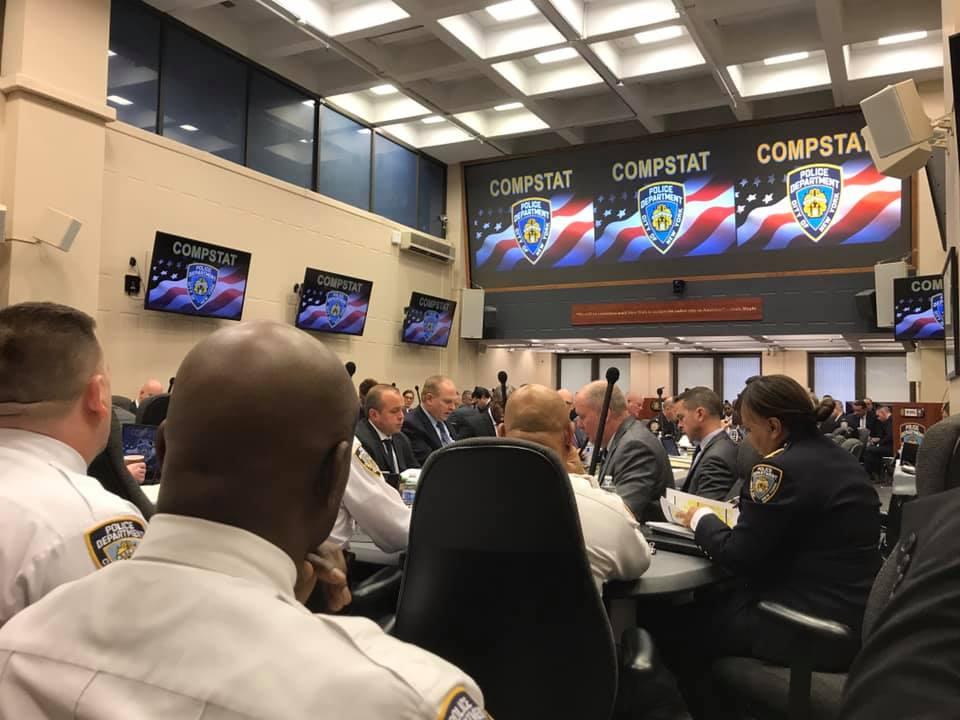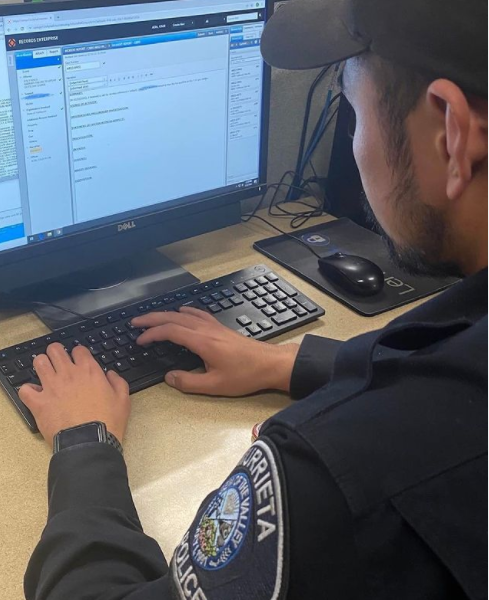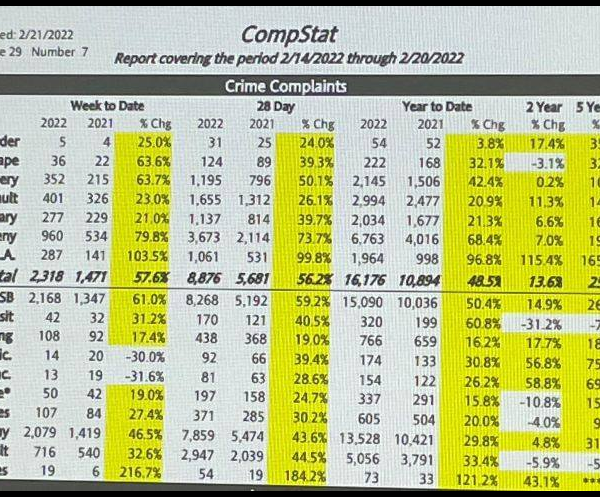
The tragic death of George Floyd understandably ignited anger among many Americans. From that temperate fury evolved the onslaught of demands to defund the police, targeting the entire police profession over the ill-conceived handling of Floyd by four Minneapolis police officers.
The nation’s criminal justice system is architected to redress defense claims, either opting for a jury (peers) or judge (bench trial) adjudicating the process and dispositions in courts of law. By and large, though, the courts are not engendered until a crime occurs, citizens dial 9-1-1, cops respond, criminal investigations ensue, and police reports are generated. That is the general course which, in the aggregate, amounts to police statistics and accountability to a significant extent—all documented, right there for people to delve deeply into what their respective police force has been doing (besides general glances of cops interacting on traffic stops, etc.).
This morning, I responded to a subpoena regarding the state defunding my autistic daughter’s behavioral support plan. Reams of data fed into computers factored into algorithms resulting in significantly defunding my daughter’s intense rehabilitation program at a state-licensed facility. So, I did what any parent in such a situation would do: scour all the records from which their algorithm decided to cleave over $24k from her annual Medicaid allotment. It took little time to zero in on inaccuracies, omissions, understatements, and the need to submit additional written materials to qualify for monetary assistance toward essential rehabilitative efforts. With all aspects addressed late yesterday, the state’s Hearing Officer and attorney refunded every single cent.
The point of that personal tidbit is intended to colorize how people, when deficient in information, make life-altering changes affecting people whose purpose and destinies are negatively impacted by decisions, similar to the knee-jerk reaction giving rise to the foolhardy defund-the-police mantra.
This experience reminded me (not for the first time) how the defund-the-police mob ran roughshod with emotion-filled sneers and jeers weighted by public opinion, not objective reasoning. As gobs of humans witnessed, the anti-cop cacophony and super-sized slander blunted law enforcement significantly, to the tune of collective billions directed away from public safety in America.
Nonetheless, the men and women of justice continued to document their every move —as per usual— this time adding the burgeon of pushback and a slew of physical assaults on police officers. It still rings true that police work requires tons of affidavits written by street cops and detectives alike, all record-keeping stored in every department’s Records Division, clearly denoting the robust activities against the tide of defunders.

(Photo courtesy of the Murrieta Police Department.)
We didn’t hear much, if anything, regarding mounds of empirical data supporting police activities—especially the saves and innumerable good-deed encounters. Enormous volumes of facts-only information buttressing the absolute need for law enforcement in our freedom-loving society is bloated from every cop’s tour of duty, 24/7/365. Several times in my life, I had my hands in vats of law enforcement statistics.
Almost all “light duty” stints I served when I was recuperating from cancer treatments, I was assigned to assist the Records Division. The police reports didn’t necessarily do anything to my psyche except to see that the job was being carried out by the bravest souls imaginable, unwaveringly. Conversely, the citizen volunteers (usually retirees) and college interns helping out in the Records hub had many eye-opening moments, reading chronological details written by shift officers accounting life-imperiling encounters. More so, though, these community helpers were exposed to a bevy of depravities committed on both day and midnight shifts (mostly mids, where I served most of my career and witnessed unspeakable realities).
Wouldn’t it have been a decent and equitable gesture of anti-cop mentalities to at least take a gander at crime stats and the diligent efforts expended by courageous cops performing right where they live? It’s rhetorical—of course, they could. But they didn’t. Every agency has a records clerk (or several, depending on the size of the force), responsible for the intake, data-keying, and chronicles of every squad’s reports. On the national level, the FBI maintains and publishes data about crime in America, all of it broken down and detailed quite well. No reason for anyone to buy into the propaganda implying cops are the problem—it’s free to read it in easily accessible banks of data stores.

(These figures fly in the face of anti-police chanters. Photo courtesy of the NYPD CompStat program displaying crime statistics.)
Although naysayers chanted negatively and made ample noise having to do with police-less enclaves, scant few politicos have found their souls and senses.
On Thursday, one of the latest elected officials to step forward and publicly acknowledge complicit errors of the defund-the-police movement is in California. Oakland Mayor Libby Schaaf has, after crime spiked and homicides were chalked, wiped some egg from her face. In a POLITICO piece titled “Oakland mayor: Defund the police push went ‘too far,’” the about-face mayor, whose jurisdiction touted Sanctuary City claims, literally warning illegal immigrants hiding in her geographical domain that Immigration and Customs Enforcement (ICE) agents were prepping to sweep for illegal aliens, has an aiding and abetting blemish on her soul—exponentially.
Here is what Mayor Schaaf shared with POLITICO: “It’s been particularly heart-wrenching in Oakland because we had just made national headlines for cutting gun violence in half and sustaining those lower rates for five years.” That’s what I mean by considering statistical data underscoring the phenomenal work cops do in communities; she says “we” when it was all the Oakland officers scrapping out there, the very ones she railed against. Schaaf continued, saying, “when we saw this surge come up during the pandemic, and let’s also be honest, after George Floyd, after this country just saw its faith in government justice compromised, we were just heartbroken.” She seemingly willy-nilly cancels out all the great police work with that statement. Although Mr. Floyd’s death is an undeniable loss, not every single cop in America was there for that horror deserving of scorn. The stats we are discussing here today attest to many thousands of law enforcement officers on duty when the Minneapolis tragedy involving Mr. Floyd transpired, each one dutifully performing great feats. Nevertheless, madness ensued while those verifiable fantastic feats by police were treated as fictitious.
Never mind the calamities and murders and property destruction committed by criminal rampancy perpetuated by defund-the-police politicians fanning the inferno. Now, like Ms. Schaaf, a minority of these elected officials have begun the walk-back, not outright reversals but more like half-baked reconfigurations on the anti-law enforcement theme.
Through recent years, police executives spent ample time at the media podium and rebuffed the defund-the-police ilk while standing elbow-to-elbow with the rank-and-file working the mean-street beat. Of course, police chiefs and sheriffs addressed matters by imploring citizens to do a ride-along (exposure to police activities in real-time) and attend citizens’ police academies (examining all police operations and units, including exposure to statistical data).
In Florida, the Sunshine Law (aka “Public Records Law”) “provides that any records made or received by any public agency in the course of its official business are available for inspection, unless specifically exempted by the Florida Legislature. Over the years, the definition of what constitutes “public records” has come to include not just traditional written documents such as papers, maps, and books, but also tapes, photographs, film, sound recordings and records stored in computers.” Other states have similar enactments availing the public access to government proceedings/records. Although certain circumstances require some redactions due to sensitivities, anyone can solicit police reports and make their conclusions of just how busy cops are in the community. Worth every cent!
Before I was sworn in as a certified LEO, I worked as a police dispatcher. One of my duties in that capacity was to facilitate our police activities log, which accounted for all daily calls for service. Various news networks’ reporters would contact us once every hour, asking, “Anything going on?” News stations also had personnel listening to scanners, following activities of first responders, and deploying video crews with field reporters to actual crime scenes or police HQ, hoping for footage and statements. These news network staffers had quite an idea of the busyness of police departments, knowing the high valuations placed on police provisions of safety and security. Via the United States Bureau of Justice Statistics public database, citizens can do their homework and figure this out for themselves; beats wondering if mainstream media is twisting facts or not.
Now that these police-budget-slashing hypocrites reconsider the oft-used words such as spiking and surging and soaring, emphasizing out-of-control crime rates (data), besides posting excerpts of a handful of interactions, police executives ought to publicize stats much more frequently. Otherwise, mainstream media hijacks the narrative and arrogantly skews/downplays police trying to reel in violence. In that context, haters who dislike doing homework act out under false impressions. If anti-cop voices continue to blindly claim cops are the problem, intelligence gathered by police departments enables much more logical, rational conclusions without all the standoffishness.
As the Nampa, Idaho police chief said about incorporating CompStat and crime analysts to track and address crime-prone zones, “the data doesn’t lie.”